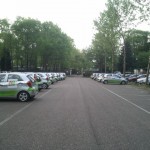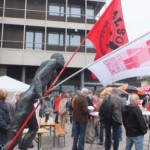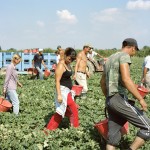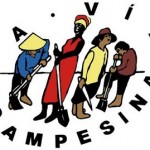Summary:
Asparagus is a luxury vegetable very consumed in Germany, since 2003 she is the first producer in Europe. But the lack of a minimum wage applied to all professional sectors and the system of Minijob (short-term contracts, very few binding on the employer) causes many abuses of agricultural workers. The agricultural labor force employed in the collection of vegetables and fruits is almost essentially foreign. Polish Historically, there has been an influx of Romanians and Bulgarian recent years. Working conditions, hard because pickups techniques are often made worse by rights violations and lack of control tools.
The imposition of a minimum wage would be a first step towards more equality between national and foreign workers, but many blockages exist among employers. They fear not being able to withstand competition and pressure on prices, this is particularly true for those who sell their production outside of short circuits.
Category Archives: COUNTRIES
Temporary work agencies and migrant workers : for a flexible and cheap labor force
Gallery

This gallery contains 2 photos.
Summarize : We estimate that at least a 50% of labor force in the netherland is provided from temporary work agencies, majority of the workers come from Poland. Apparently it seems that there is very few labor violations, but in … Continue reading
Certification : an answer to the seasonal migrant workers exploitation? An example for thought
Gallery
Summarize : The lack of certification for asparagus and strawberry producers is explained by the fact that producters prefer to employ cheap labor force even if labor law is not respected. This label doesn’t seem to encourage good practices but … Continue reading
Regulation of temporary work agency in the Netherlands
Gallery
Summarize : In order to fight against abuses, the governement is using a certification for the subcontracting firms respecting labor law and other criterias. These firms have to be registered in order to facilitate controls. The governement promised that if … Continue reading
“Better choice and better value …. For a better life, every day”? (Royal Dutch Ahold group)
Gallery
Summarize : The Immokalee farmworkers is a coalition of around 5000 latin-american workers, employed in tomatos and citrus fruit harvest in Florida. Their movement is characterized by three campains : “A penny per pound”, asking the fast food to raise … Continue reading
Demonstration in Cloppenburg against modern slavery
Gallery

This gallery contains 1 photo.
On 26 April 2014, about 200 people gathered in Cloppenburg to protest against the abuses of outsourcing contracts and to denounce the unacceptable working conditions and life, imposed detached and seasonal workers. Organized by Mida (network for human dignity at … Continue reading
“The whole system is a fraud to the entire society” – Interview with Matthias Brümmer
In 2012, about 58 million pigs, 3.6 million cattle and 1 million sheep were slaughtered in Germany. The German meat industry is so effective that the country has become the slaughter of Europe, but also on the way to becoming the world’s largest meat exporter. With the start of the barbecue season, Lidl offers 20% per kilo of pork loin or € 3.99 per kilo. This award is achieved through the exploitation of workers, mostly East European countries. This with the help of the directive on the posting of workers to principles rather vague, leaving room for all kinds of abuse from shady supplier. Matthias Brümmer, head of the local branch of Oldenburg union for food and catering (NGG) explains how the business of cheap meat.
In search of a better life: photographing migrant workers
Gallery

This gallery contains 7 photos.
Migrant workers today: they cut our meat, they take care of our seniors, they harvest our fruits and vegetables and build our homes. The province to major cities, Bulgaria, Poland or Romania to Germany: they leave their countries in hopes … Continue reading
The network Faire Mobilität a step towards improving the working conditions of workers posted to Germany
Gallery

This gallery contains 2 photos.
Summary: Faire Mobilität The program was set up to make them more equitable conditions of living and working in Germany, addressing specifically to migrant workers. The six centers Faire Mobilität operate in networks, embedded in local and national levels. The actions are … Continue reading
Common Declaration Palestine/France
Gallery

This gallery contains 1 photo.
Common declaration – April 2014 UAWC, PNGO, BDS, LRC, PFU, Confédération paysanne Ramallah, Tuesday April 1st, 2014, Following a year of common work on the theme of migrant and seasonal farm workers in Palestine between UAWC and the French farmers’ … Continue reading
The Dutch agriculture, or the excessive intensity of a production ?
Gallery
Summarize : To think about dutch agriculture can lead you, at least for some of you, to imagine colorful flower fields, green pasturelands lined by rivers and scattered by mills, browsed by black and white cows, sheep woolen … briefly, … Continue reading
Call for paper: International seminar – Migrant Labour and Social Sustainability of Global Agri-Food Chains – University of Murcia, November 5-7 2014
Gallery
During the last decades the globalization process of the agro-food system has stimulated the spread of new enclaves of intensive agricultural production all over the world. These spaces of production have turned into the scene of an intense process … Continue reading
Meeting with a foreman for a German slaughterhouse: “I didn’t mind about all this”
Gallery
Recently I was able to speak with a former butcher and foreman in a pig slaughterhouse, located south of Oldenburg. He worked for several years and was willing to share with me his experience with employees of subcontractors. Summary: He … Continue reading
A brief about the legal framework of migrant labor in The Netherlands
Gallery
Aim of this little article is to give few insights on basis of the legal framework of labor in The Netherlands, in which seasonal migrant work in agriculture is also attached. A return on legal framework of labor in … Continue reading
“If you’re not happy, go away!”
Germany, the leading European food industry is increasingly criticized for the social and environmental price for its economic success. Only two weeks after my arrival in Lower Saxony, I have already seen the devastating effects of its operation. For years, thousands of posted workers suffer abuses of unscrupulous subcontractors. Through these “service contracts” large groups such as Tönnies, Danish Crown, Heidemark, Vion “rent” contract workers. These service contracts can circumvent the German labor law and to drastically cut wages. Beyond the damage suffered by the employees, this creates a problem of unfair competition. Most of these contract workers are from Eastern Europe (Romania, Poland, Bulgaria) and are subject to daily pressures. They are willing to accept conditions of living and working close to slavery, for fear of losing their jobs and having to return home without money.
Summary:
The testimonies of some former slaughterhouse workers report numerous violations of the rights of unsustainable rates, threats … Given the particular problem in the Lower Saxony region a consultancy mobile cell and access to rights was mounted in the program Faire Mobilität. More and more exploited workers use them. One of the counselors testify situations observed and the mafia look of subcontracting companies. For her the imposition of a minimum wage does present a partial solution if the checks were conducted on the workplace but also in life. According to her the exploitation of migrant workers in Lower Saxony receives little interest from public opinion, more concerned about the breeding conditions and slaughter of animals.

